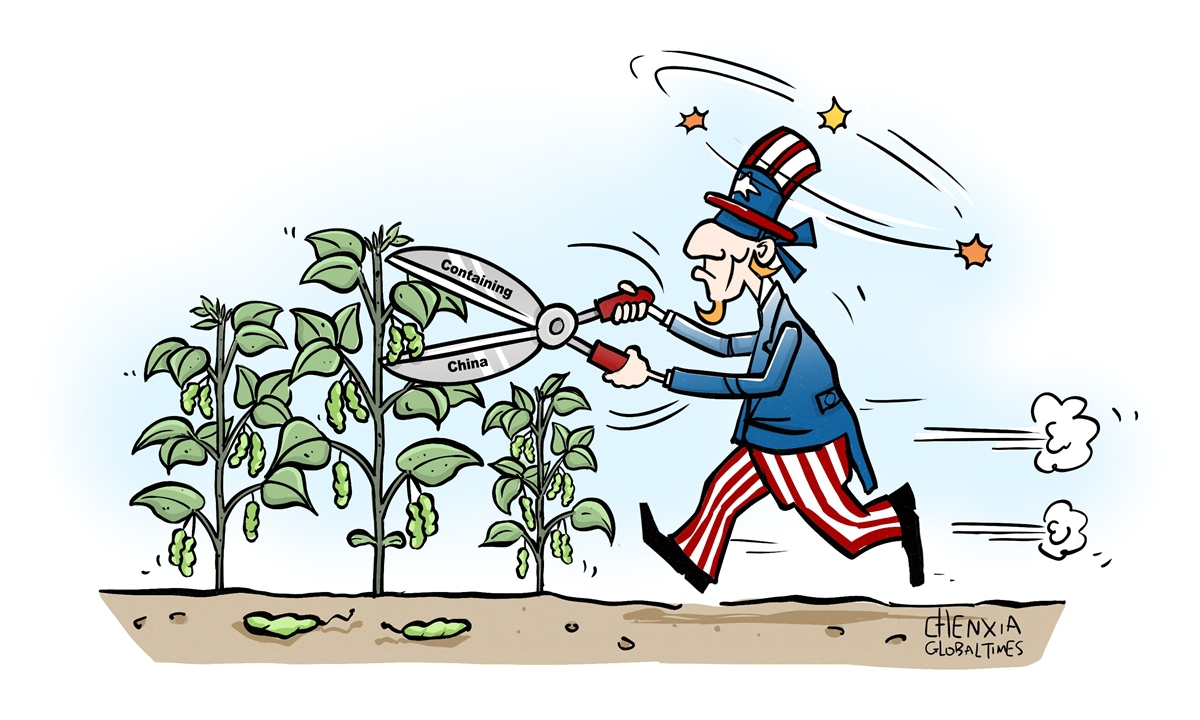
Illustration: Chen Xia/Global Times
Given the huge impact of the previous China-US trade war on American farmers,
concerns over a new trade war seems to have haunted the market sentiment these days. Regardless of the outcome of the US election, the stance of Chinese soybean importers toward the US' trade war with China has always been clear and firm. Chinese buyers have always prioritized a stable supply chain and fair environment in international trade. If the new administration of the US chooses to continue or escalate the trade war, it is possible that US soybean exports could be affected, as Chinese buyers will need to reevaluate their import portfolio and seek out alternative sources of soybean supplies.
China, the world's biggest soybean importer, is likely to import record volumes of soybean in July, securing higher volumes in recent weeks, Reuters reported on Monday.
Analysts attributed the soybean purchases to concerns over a possible trade war following the US election, as traders seek to protect themselves from uncertainties surrounding potential new tariffs on Chinese goods by the US.
Such concerns seem justified. US President Joe Biden has already announced a significant increase in tariffs on various Chinese goods and the continuation of the tariffs on over $300 billion of Chinese products. In the 2024 presidential campaign, former president Donald Trump has proposed a plan to impose tariffs of 60 percent or higher on Chinese goods if he wins a second term.
The latest development has undoubtedly added to market uncertainty regarding future trade relations between China and the US. Such uncertainty not only impacts the market expectations of American farmers but also raises concerns over trade flows and price volatility in agricultural products globally.
After the Trump administration launched a trade war with China in 2018, China imposed a 25 percent tariff on US soybeans, causing US soybean exports to China to plunge to 16.6 million tons in 2018 from 32.9 million tons in 2017, according to media reports. The tariffs significantly reduced the competitiveness of US soybeans in the Chinese market, prompting many Chinese companies to seek alternative sources such as Brazil.
Soybean farmers felt the brunt of this impact directly. Their exports to China dropped sharply. A collapse in exports led to a huge inventory build-up and a sharp drop in prices, which affected the incomes of American farmers. In 2019, US farms experienced a 20 percent spike in bankruptcies, even with financial help from the US government.
Furthermore, the trade war has prompted China to be more active in pursuing alternative sources to meet its agricultural demand, resulting in a lasting impact on US soybean exporters. In 2023, soybean imports from Brazil made up 70 percent of China's total soybean imports, far exceeding the 24 percent share of the US. The stark contrast serves as a clear indicator of the toll that the trade war has taken on American farmers.
Also, in addition to diversifying its import sources, China has also taken steps to enhance the size and productivity of domestic soybean cultivation through policy backing and technological advancements in order to strengthen the nation's food security.
It should be noted that while American farmers have unfortunately suffered the direct consequences of the trade war - economic losses and market uncertainty - there has been no winner, as both parties have suffered huge losses.
In January, China and the US restarted their agricultural cooperation mechanism at the seventh meeting of the China-US Agricultural Cooperation Joint Committee in Washington. As the first meeting since 2015 of the China-US agricultural cooperation, it confirmed the willingness of both sides to continue agricultural cooperation.
However, the future of China-US agricultural trade requires stability and sustainability. Escalating trade tensions will not only harm the economies of the US and China but also jeopardize the livelihoods of US farmers in the long run.
In this sense, preventing another trade war from happening is not only a necessity for American farmers but also a requirement for maintaining the stability of bilateral economic and trade relations.
